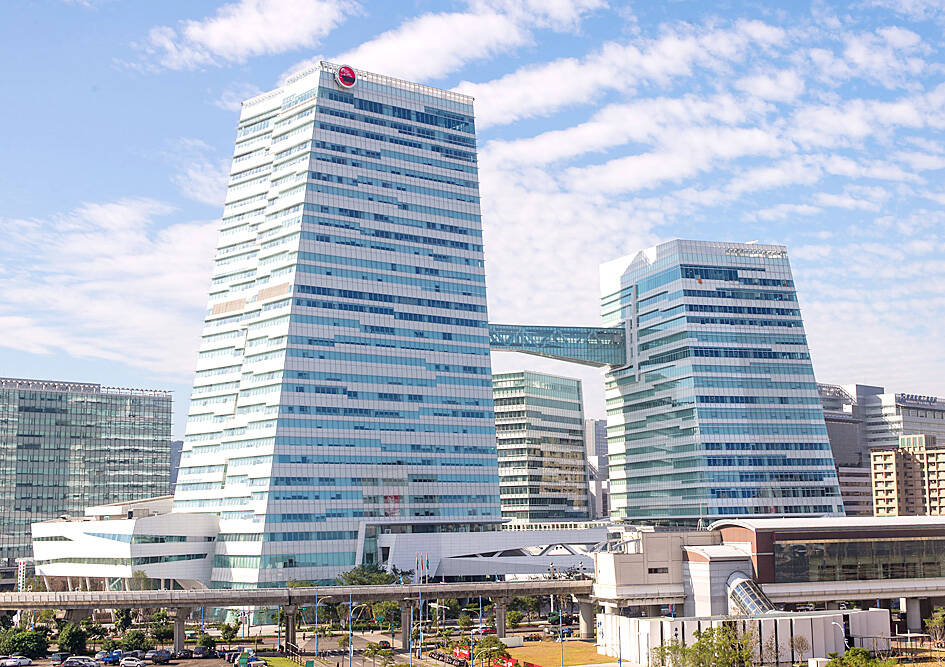CTBC Bank (中國信託商銀) was the only bank among the nation’s six “domestic systemically important banks” (D-SIB) that retained a capital adequacy gauge above the minimum requirements as of the end of June, data released last week by the Financial Supervisory Commission showed.
Five other D-SIBs failed to meet the requirements of 11 percent for a common equity tier-1 ratio, 12.5 percent for a tier-1 capital ratio and 14.5 percent for capital adequacy ratio, as set by the regulator due to the effects of volatile financial markets, the commission said.
CTBC’s common equity tier-1 ratio, tier-1 capital ratio and capital adequacy ratio stood at 11.7 percent, 13.29 percent and 15.15 percent respectively at the end of June, commission data showed.

Photo courtesy of CTBC Bank Co
These gauges provide regulators and investors with the information required to estimate whether a bank can withstand financial stress. To meet higher requirements, a bank usually boosts its core capital or reduces its loans.
The other five banks are Taipei Fubon Commercial Bank (台北富邦銀行), Cathay United Bank (國泰世華銀行), Mega International Commercial Bank (兆豐銀行), Taiwan Cooperative Bank (合庫銀行) and First Commercial Bank (第一銀行).
The commission said the five banks saw some or all of their capital gauges fall below the minimum requirements because of higher risk-weighted assets such as mortgages, or due to falling core capital like shareholders’ equity or retained earnings, it said, adding that banks should promptly improve their capital standards.
Banks in Taiwan reported an average common equity tier-1 ratio of 10.8 percent, tier-1 capital ratio of 12.03 percent and capital adequacy ratio of 14.22 percent at the end of June.

TAKING STOCK: A Taiwanese cookware firm in Vietnam urged customers to assess inventory or place orders early so shipments can reach the US while tariffs are paused Taiwanese businesses in Vietnam are exploring alternatives after the White House imposed a 46 percent import duty on Vietnamese goods, following US President Donald Trump’s announcement of “reciprocal” tariffs on the US’ trading partners. Lo Shih-liang (羅世良), chairman of Brico Industry Co (裕茂工業), a Taiwanese company that manufactures cast iron cookware and stove components in Vietnam, said that more than 40 percent of his business was tied to the US market, describing the constant US policy shifts as an emotional roller coaster. “I work during the day and stay up all night watching the news. I’ve been following US news until 3am

UNCERTAINTY: Innolux activated a stringent supply chain management mechanism, as it did during the COVID-19 pandemic, to ensure optimal inventory levels for customers Flat-panel display makers AUO Corp (友達) and Innolux Corp (群創) yesterday said that about 12 to 20 percent of their display business is at risk of potential US tariffs and that they would relocate production or shipment destinations to mitigate the levies’ effects. US tariffs would have a direct impact of US$200 million on AUO’s revenue, company chairman Paul Peng (彭雙浪) told reporters on the sidelines of the Touch Taiwan trade show in Taipei yesterday. That would make up about 12 percent of the company’s overall revenue. To cope with the tariff uncertainty, AUO plans to allocate its production to manufacturing facilities in

Six years ago, LVMH’s billionaire CEO Bernard Arnault and US President Donald Trump cut the blue ribbon on a factory in rural Texas that would make designer handbags for Louis Vuitton, one of the world’s best-known luxury brands. However, since the high-profile opening, the factory has faced a host of problems limiting production, 11 former Louis Vuitton employees said. The site has consistently ranked among the worst-performing for Louis Vuitton globally, “significantly” underperforming other facilities, said three former Louis Vuitton workers and a senior industry source, who cited internal rankings shared with staff. The plant’s problems — which have not

COLLABORATION: Given Taiwan’s key position in global supply chains, the US firm is discussing strategies with local partners and clients to deal with global uncertainties Advanced Micro Devices Inc (AMD) yesterday said it is meeting with local ecosystem partners, including Taiwan Semiconductor Manufacturing Co (TSMC, 台積電), to discuss strategies, including long-term manufacturing, to navigate uncertainties such as US tariffs, as Taiwan occupies an important position in global supply chains. AMD chief executive officer Lisa Su (蘇姿丰) told reporters that Taiwan is an important part of the chip designer’s ecosystem and she is discussing with partners and customers in Taiwan to forge strong collaborations on different areas during this critical period. AMD has just become the first artificial-intelligence (AI) server chip customer of TSMC to utilize its advanced